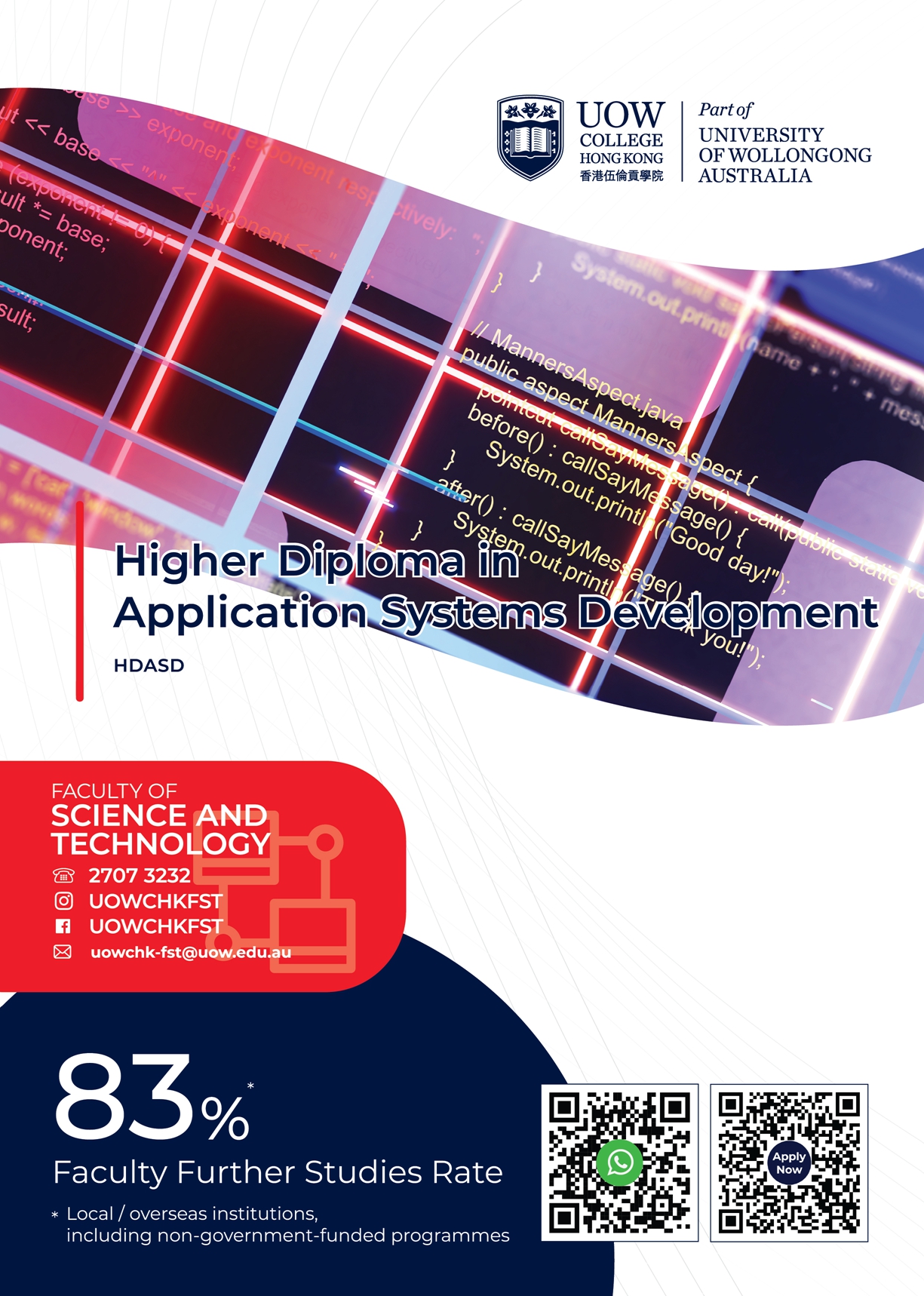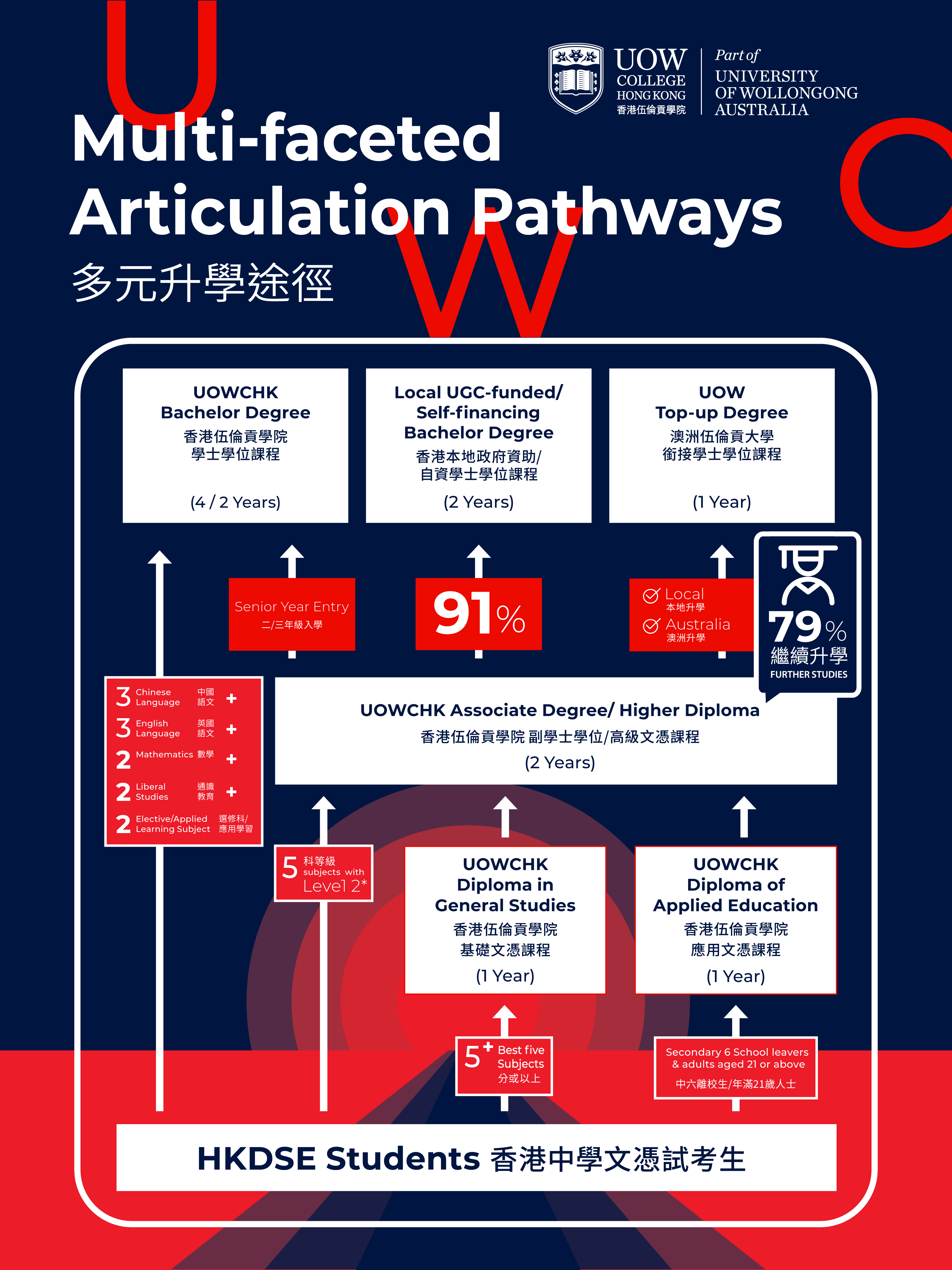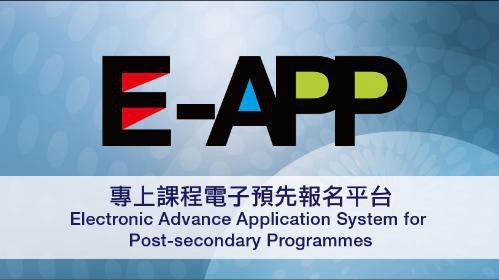Information Technology
- Bachelor of Computer Science
- Bachelor of Science (Honours) in Artificial Intelligence
- Bachelor of Science (Honours) in Smart-City Technology and Urban Informatics
- Associate of Science in Network and Systems Administration
- Associate of Science in Information Systems Development
- Higher Diploma in Application Systems Development
- Higher Diploma in Computer Network and Systems Administration
Higher Diploma in Application Systems Development
Application Systems Development Programme
The programme focuses on the latest developments in information and communication technology (ICT), allowing students to gain a solid foundation in mathematics and computer science concepts. The programme's emphasis on practical training and hands-on experience allows students to learn the skills necessary to become successful computer scientists and software engineers. The inclusion of a sponsored live project, industrial internship experience, and overseas summer exchange.
Apply Now- Programme information
- Articulation Pathways
- Admission
- Entry Requirements
- FEES & FINANCIAL ASSISTANCE

Programme information
| Faculty | Science and Technology |
| Programme | Higher Diploma in Application Systems Development |
| Programme code | HDASD |
| Campus | Tai Wai |
| QF level | 4 |
| Duration | 2 years |
| Credit units | 63CUs |
| Award type | Higher Diploma |
| QR Ref/ Validity period |
20/000678/L4 01/09/2020-31/08/2024 |
This programme is accredited by the Hong Kong Council for Accreditation of Academic and Vocational Qualifications.
Leaflet
Programme Leaflet of the HDASD programme in 2024-25
Enquiry
For enquiries, please contact Faculty of Science and Technology (Telephone No: 2707 3232 or Email: uowchk-fst@uow.edu.au).

Applications can be submitted by the following methods:

|

|

|
|---|---|---|
|
Online Application |
Electronic Advance Application System for Post-secondary Programmes (E-APP) |
By Post / In Person (Application Form) |
Click here for more information on admissions procedures.
No programme specific entry requirement. Please refer to General entry requirements
Fees
Application Fee
$150
Application fee is payable when applicants are invited for interviews. Application fee can be paid by the following methods:
- By direct deposit at any branch of the Hang Seng Bank or ATM transfer (Bank Code: 024) (A/C number: 359-300001-004) OR
- By Octopus Card at the College Office
Tuition Fee
HK$1,900 per credit x 63 Credits unit required for Programme Completion
= HK$119,700 (Total tuition fee for two years)
Other Fee
A Graduation Fee of HK$400 will be charged upon enrolment in a programme.
Financial Assistance
Students enrolled in self-financing Bachelor/ Associate Degree / Higher Diploma programmes are eligible to apply for financial assistance from the following sources:
Financial Assistance Scheme for Post-Secondary Students (FASP)
Provides means-tested financial assistance to needy full-time students pursuing locally-accredited, self-financing post-secondary education programmes at the level of associate degree, higher diploma or degree. The scheme aims to provide financial assistance to needy students so that no eligible students will be denied access to post-secondary education because of lack of means.
Enquiries: 2152 9000
Website: Financial Assistance Scheme for Post-Secondary Students
Non-means Tested Loan Scheme for Post-Secondary Students (NLSPS)
The NLSPS is used to complement the Financial Assistance Scheme for Post-secondary Students (FASP) to provide loan(s) to eligible students to settle tuition fees of locally-accredited, self-financing full-time post-secondary education programmes at the level of associate degree, higher diploma or degree
Enquiries: 2150 6222
Website: Non-means Tested Loan Scheme for Post-Secondary Students
Programme structure and outcomes
- Learning outcomes & Main subject areas
- Programme study flow & structure
- Further Studies Pathways & Career prospects
Programme Intended Learning Outcomes
Programme Intended Learning Outcomes (PILOs) are statements of learning achievement that are expressed in terms of what the learner is expected to know, understand and be able to do upon completion of a course. Students graduating from this programme will be able to:
| PILO | Description |
|---|---|
| 1. | Apply information technology and integrate concepts, principles and practices of system development to develop information systems. |
| 2. | Use a range of tools, programming languages, methodologies, technical knowledge and quantitative skills to undertake information systems development work individually or as a team. |
| 3. | Perform skilled tasks requiring some discretion and judgement in the areas of information systems development activities. |
| 4. | Identify and apply best practice in application development with emphasis on ethical and professional dimensions. |
| 5. | Communicate effectively in English with relevant stakeholders, both orally and in writing, in a culturally diversified workplace. |
| 6. | Evaluate computer systems development solutions along socio-economic, and environmental dimensions. |
Main subject areas
- Application development
- System development
- Information systems
- Computer programming
- Database systems
- System design methodology
- Language and general education
Programme study flow
Programme structure
To qualify for this award, a candidate shall accrue an aggregate of at least 63 credit units by satisfactory completion of the following core courses.
| Course Code | Course Name |
|---|---|
| Programme Core (45CUs) | |
| Sem A, Year 1 | |
| AST10106 | Programming Fundamentals |
| AST10201 | Computer Organization |
| AST10303 | Understanding the Network-Centric World |
| Sem B, Year 1 | |
| AST11110 | Introduction to Web Development |
| AST20201 | Web Programming |
| AST21105 | Object-Oriented Programming and Design |
| Summer Sem, Year 1 | |
| AST20715 | Internship |
| Sem A, Year 2 | |
| AST10111 | Basic Calculus and Linear Algebra |
| AST20105 | Data Structures & Algorithms |
| AST20208 | Mobile Apps Development |
| AST20401 | Database Systems and Design |
| AST21402 | Software Design |
| Sem B, Year 2 | |
| AST20404 | Information Systems in Business |
| AST21111 | Discrete Mathematics |
| Programme Electives (3CUs) | |
| Sem B, Year 2 | |
| Select any one: AST20203 or AST21403 |
Internet Security Software Development Project |
| Language Skills (9CUs) | |
| CGE1000* / 1500 | English for Academic Studies A / B |
| CGE2003 | English Professional Communication Skills for Technology |
| CGE1200** | Practical Chinese |
| General Education (6CUs) | |
| CGE13213 | Information Technology : Applications and Impacts |
| CGE24411 | Ethics and Society |
|
* Students whose DSE score of English Language is below 3 are required to complete this course ** Students who are non-Chinese literate can take a course among the core General Education courses in lieu of CGE1200 Practical Chinese at the recommendation of Programme Leaders and approval by the Chairman of Academic Board |
|
Further Studies Pathways
The table below is not exhaustive and only aims to show some examples of the bachelor's degree programmes offered by UGC-funded institutions and University of Wollongong, Australia which have admitted our past graduates. Our graduates also articulate to various overseas degree programmes offered in Hong Kong.
UOW College Hong Kong
University of Wollongong, Australia
City University of Hong Kong
- Bachelor of Engineering in Computer and Data Engineering
- Bachelor of Engineering in Information Engineering
- Bachelor of Science in Computer Science
- Bachelor of Science in Creative Media
Hong Kong Baptist University
- Bachelor of Science (Honours) in Computer Science
The Chinese University of Hong Kong
- Bachelor of Engineering in Computer Science and Engineering
- Bachelor of Engineering in Information Engineering
The Education University of Hong Kong
- Bachelor of Education (Honours) (Secondary) - Information and Communication Technology
The Hong Kong Polytechnic University
- Bachelor of Science (Honours) Scheme in Computing and AI (Computer Science / Financial Technology and Artificial Intelligence / Enterprise Information Systems)
The Hong Kong University of Science and Technology
- Bachelor of Engineering in Computer Engineering
- Bachelor of Engineering / Bachelor of Science in Computer Science
The University of Hong Kong
- Bachelor of Engineering in Computer Science
- Bachelor of Science in Information Management
Career prospects
With the graduates’ comprehensive knowledge and skills in programming, web and mobile application development, system administration, and database management, they can land jobs such as software developers, web developers, mobile app developers, system administrators, database administrators, and IT project managers. Additionally, their proficiency in ethical considerations and internet security opens doors to successful careers in cybersecurity and data protection.
Faculty of Science and Technology
Phone / Whatsapp: (852) 2707 3232
Fax: (852) 2707 3231
Email: uowchk-fst@uow.edu.au
